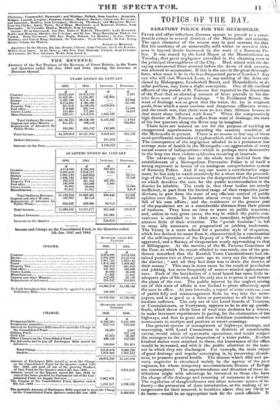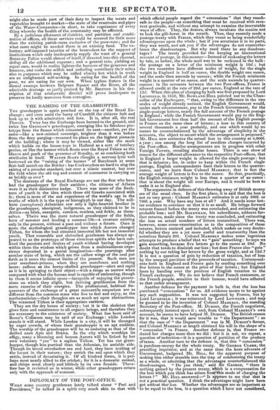TOPICS OF THE DAY.
SANATORY POLICE FOR THE METROPOLIS.
FEVER and other infectious diseases appear to prevail to a consi- derable extent in several districts of the Metropolis and suburbs: The open character of the season may in part account for this. But the tendency of an unnaturally mild winter to occasion sick- ness is beyond doubt increased by the want of a Sanatory Po- lice. It was stated by the Lord Mayor at the 'Mansionhouse on Tuesday, that great negligence prevailed in the cleansing even of the principal thoroughfares of the City. Mud, mixed with the de. cayiug unremoved litter strewed before the doors of sick persons, was allowed to accumulate. If this is the casein the great thorough- fares, what must it be in the less-frequented parts of London ? Any one who will visit Warwick Lane, to say nothing of the delta en- closed by Bishopsgate, Leadenhall Street, and Houndsditch, or si- milar purlieus, may form a slight conception. One of the medical officers of the parish of St. Pancras has reported 'to the Guardians of the Poor that an alarming amount of fever prevails in his dis- trict from want of proper drainage. "In Ferdinand Street, the want of drainage was so great that the water, &c. lay in stagnant pools, from which a most noxious and dangerous effluvium arose; and the result was, that there were no less than thirteen houses in that street alone infected with fever." When the comparatively high district of St. Pancras suffers from want of drainage, the state of the low quarters along the River may be imagined.
These facts are insisted on not for the purpose of exciting an exaggerated apprehension regarding the sanatory condition of the Metropolis at present. There is no reason to fear any of those semi-pestilential outbreaks of typhus which still visit us at intervals. The consequence of the negligence alluded to is a permanent low average state of health in the Metropolis-an aggravation of every casual source of indisposition-which is perhaps more destructive in the long run than violent epidemics recurring at intervals.
The advantage that has on the whole been derived from the establishment of a Metropolitan Preventive Police is of itself a strong argument in favour of an analogous comprehensive system. of Sanatory Police. And if any one wants a corroborative taps. meat, he has only to watch attentively for a short time the proceed- ings of the Vestry, or whatever be the designationof the local board on which devolves the care for the public accommodation in the district he inhabits. The truth is, that these bodies are utterly inefficient, in part from the limited range of their respective jurisp dictions, in part from the want of any efficient control of public opinion over them. In London almost every man has his hands full of his own affairs; and the residences of the greater part of the population are at a considerable distance-from their placep of business. They have no time to waste on public concerns; and, unless in very gross cases, the way in which the public con- venience is attended to in their own immediate neighbourhood attracts little of their attention. The "parish business " is left to stray •idle amateurs, or pragmatical or jobbing tradesmen. The Vestry is a -mere school for a peculiar style of eloquence, which has derived its name from it, characterized-by a combination of the self,importance of the Deputy of a Ward, considerably ex- aggerated, and-a fluency of vituperation nearly approaching to that of Billingsgate. At the meeting of the St. Pancras GuIrdians of the Poor, to which the report alluded to was made, one of the gen- tlemen remarked that the Kentish Town Commissioners had ob- tained powers two or three years ago to carry out the drainage.of the district ; " and all they had done was to drain the district of their money." This may in some cases be the result of peculation and jobbing, but more frequently of narrow-minded opinionative- ness. Each of the busybodies of a local board has some little in- adequate plan of his own, and his only aim is to press it and thwart the plans of the rest. The public injured by the neglect arising out of this state of affairs is too limited to press effectively upon the men in office. At rare intervals, a report of some extreme'ease of parish folly and mismanagement finds its way into the news- papers, and is at good as a farce or pantomime to all but the im- mediate sufferers. The only use of our Local Boards of Trustees, or Commissioners, or Vestrymen, appears to be to stir up parish- feuds, which throw whole lines of road into darkness for a winter, to make incessant experiments in paving, for the obstruction of the highways, and first to grant and then withdraw,perrnission to erect monuments to martyrs and patriots at street-crossings.
One general system of management of highways, drainage, and scavenging, with Local Committees in districts of considerable extent, would admit of systematic operations, and would subject the managers to the critical inspection of a wider public. If other kindred duties were attached to these, the importance of the office would be increased, and with it the public attention to the man- ner in which they are discharged. For example, the main object of good drainage and regular scavenging is, by preserving cleanli- ness, to promote general health. The disease which filth and po- verty engender is circulated mainly by the agency of the poor vagrants, for whose temporary accommodation Houses of Refuge are contemplated. The superintendence and direction of these ia- stitutions might with advantage be intrusted to those who have the charge of the drainage and removing of nuisances in a district. The regulation of slaughterhouses and other noisome scenes of in- dustry-the.prevention of their introduction, or the making of ar- rangements for their removal, in localities where they are likely to do harm-wonld be an appropriate task for the same officials. It might also be made part of their duty to inspect the meats and vegetables brought to market—the state of the reservoirs and pipes of the Water-Companies—in short, to take cognizance of every thing whereby the health of the community may be affected. By a judicious allotment of districts, and partition and combi- nation of offices, all these services could be secured for little more than the existing parish-rates exclusive of the poor-rate; and for what more might be needed there is an existing fund. The vo- luntary self-imposed taxation of the benevolent for the support of institutions which only inadequately supply the want of a general Sanatory Police would almost of itself, if directed into this channel, defray all the additional expense ; and a general rate, yielding an equal sum, would in reality lighten the burdens of the generous and humane, and make the selfish and unfeeling contribute their mites also to purposes which may be called charity but which in truth are an enlightened self-seeking. In caring for the health of the poor, we are caring for our own. When typhus festers in the dismal swamps between Belgrave Square and the River, all the admirable drainage so justly praised by Mr. BRITTON in his des- cription of that aristocratic district will prove inadequate to preserve its lordly mansions from contagion.































 Previous page
Previous page